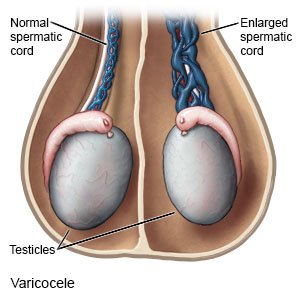Varicocele
Medically reviewed by Drugs.com. Last updated on Aug 4, 2025.
What is a varicocele?
A varicocele is a condition that causes the veins in your scrotum to become large, twisted, and swollen. The scrotum is the sac that holds the testicles. A varicocele can cause infertility (trouble getting your partner pregnant).
 |
What causes a varicocele?
The cause of varicoceles is not known. A varicocele may occur if the valves in your scrotal veins do not work properly. Valves open and close to keep the blood flowing in one direction. When the valves do not work properly, blood backs up and causes the veins to swell and become large.
What are the signs and symptoms of a varicocele?
- A lump or swelling in the scrotum that feels like a bag of worms
- Pain or ache in your scrotum
How is a varicocele diagnosed?
Your healthcare provider will examine your scrotum while you stand. Your provider may ask you to take a deep breath, hold it, and bear down like you are having a bowel movement. An ultrasound or Doppler ultrasound may be done to show the varicocele in your scrotum. An ultrasound uses sound waves to show pictures on a monitor.
How is a varicocele treated?
Treatment may help relieve symptoms such as pain, or improve fertility:
- NSAIDs , such as ibuprofen, help decrease swelling, pain, and fever. This medicine is available with or without a doctor's order. NSAIDs can cause stomach bleeding or kidney problems in certain people. If you take blood thinner medicine, always ask your healthcare provider if NSAIDs are safe for you. Always read the medicine label and follow directions.
- An athletic supporter , or jockstrap, can help reduce swelling in your scrotum.
- Embolization is a procedure to create a clot or block in a blood vessel. This stops blood flow to the vein and can help decrease your symptoms.
- Surgery may be needed to cut or tie off the vein. This will help blood to flow into your other scrotal veins and help decrease your symptoms. Surgery may also be needed if you have more than 1 varicocele.
When should I call my doctor?
- You have pain in your scrotum.
- You have a new lump on your scrotum.
- You have questions or concerns about your condition or care.
Care Agreement
You have the right to help plan your care. Learn about your health condition and how it may be treated. Discuss treatment options with your healthcare providers to decide what care you want to receive. You always have the right to refuse treatment. The above information is an educational aid only. It is not intended as medical advice for individual conditions or treatments. Talk to your doctor, nurse or pharmacist before following any medical regimen to see if it is safe and effective for you.© Copyright Merative 2025 Information is for End User's use only and may not be sold, redistributed or otherwise used for commercial purposes.
Further information
Always consult your healthcare provider to ensure the information displayed on this page applies to your personal circumstances.
